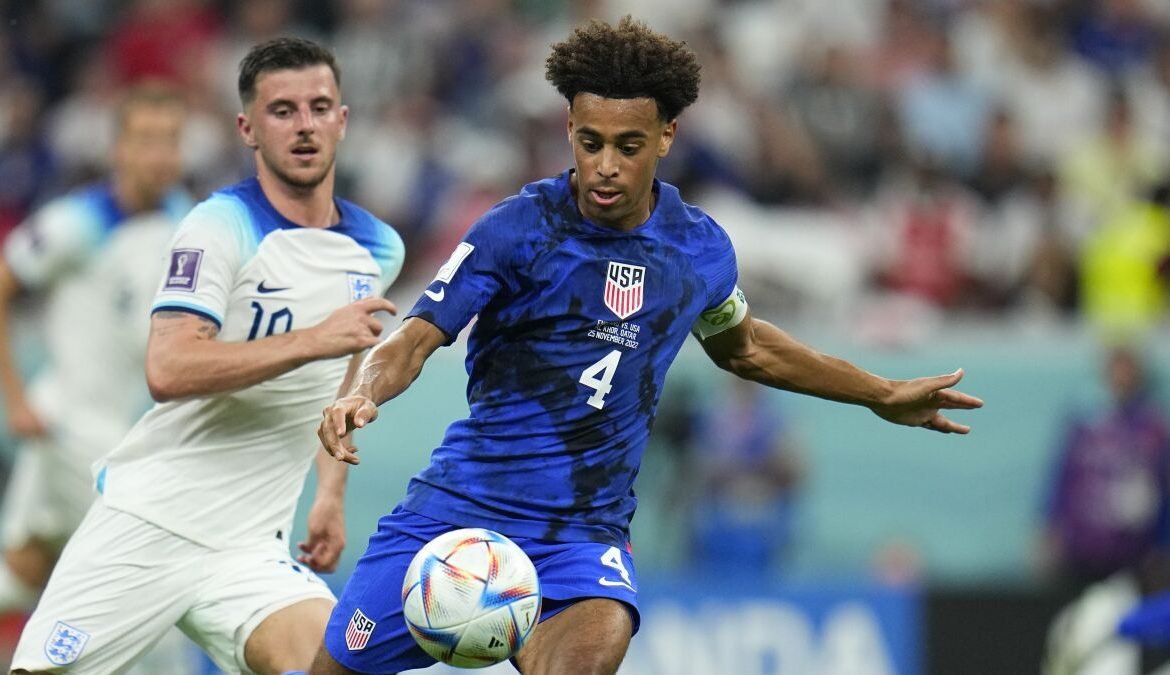In four years with the U.S. national team, Gregg Berhalter has coached 58 games, traveled tens of thousands of miles, auditioned dozens of players and run too many training sessions to count.
All that work will now come down to 90 minutes Tuesday when the U.S. faces Iran in its final group-stage match of the 2022 World Cup with a berth in the knockout rounds at stake. And the scenario couldn’t be simpler: win and the U.S. goes on, lose or draw and it goes home.
“It sounds kind of illogical to judge four years on one game, but that’s our business,” Berhalter said. “We said that this team is going to be judged on what we do at the World Cup. So that’s fine. We’ll deal with it.”
What the Americans have accomplished so far in Qatar would probably get a “C” on most report cards: they’ve done just enough to get by, drawing Wales and England to enter the final group game both unbeaten and winless. But they’ll have to bring their A game against Iran, the lowest-ranked team in the group but the only one standing between the U.S. and the next round.
“This is a knockout game for both teams,” he said. “So it’s going to be a high level of intensity.”
The U.S. made the Round of 16 three times in the four previous World Cups it has played in this century. To do that again, however, it is going to have to score and its only goal so far in this World Cup came 36 minutes into its first game with Wales. The Americans have put just one other shot on goal.
Nevertheless Carlos Queiroz, the former MLS coach who has taken Iran to three World Cups, yet won just two games, did his best to tamp down expectations for his side. Iran hasn’t advanced out of group play since 1978, the year before the country’s Islamic revolution.
“The team in this group that produced the best two performances was, without any doubt, the United States. They played two great and fantastic games,” he said.
The winner Tuesday, he continued, would be the team that rises to the occasion.
“The moment the curtains open, if you’re not ready to sing and dance, the gods of football can’t help you,” he said.
For such an important game — or maybe because it’s such an important game — the pre-match news conference spun out of control rapidly. In less than two weeks in Qatar, the U.S. team has been forced to field questions about workers’ welfare and LGBTQ rights. On Monday, Iranian journalists grabbed the microphone to make extended political statements before asking Berhalter to explain the presence of U.S. warships in the Persian Gulf and the state of the American economy.Captain Tyler Adams, who is biracial, was berated for mispronouncing Iran, then asked why he was playing for the U.S. given the country’s history of racism.Both dodged the landmines artfully and kept the focus on soccer, a subject the Iranians rarely touched on.“For us it’s a soccer game against a good team. And it’s not much more than that,” Berhalter said. “It’s a knockout game. Both teams want to go to the next round. Both teams are desperate to win the next round. And that’s how we’re looking at this match.”The Iranians were angry that a handful of U.S. Soccer’s social media posts over weekend removed the Islamic Republic’s emblem from the Iranian flag. According to a federation spokesman that was done to show “support for the women in Iran fighting for basic human rights,” a nod to the millions of Iranians who have taken to the streets to protest the death of 22-year-old Mahsa Amini, who died in police custody in September after being detained for wearing her hijab incorrectly.
But Iranian state television said the U.S. federation’s move was akin to “removing the symbol of Allah” from the Iranian flag and demanded the American team be disqualified from the tournament. On Monday, Berhalter apologized but said the players and coaching staff were not aware of the social media posts.
As for the game, Berhalter said he wants his team to take their inspiration for the last time the U.S. met Iran in a World Cup in 1998, a game Berhalter watched on Dutch TV.
“That game just sticks in my mind,” he said. “What I saw from the opening whistle is one team really wanted to win the game and one team didn’t really want to win the game. They played really committed, really focused.”
In 1998 that committed team was Iran, which won 2-1.
“For us to have a chance to advance,” Berhalter said Monday, “that’s going to have to be the mind-set of our group.”
This article is originally published at yahoo. sport.com



